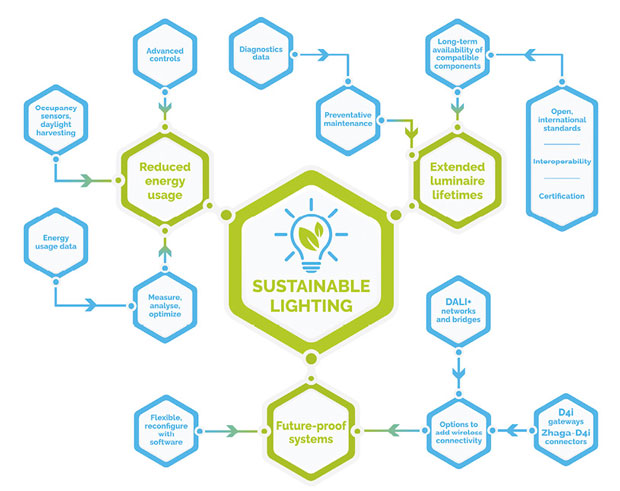DALI AND SUSTAINABILITY
The introduction of new sophisticated lighting control systems has delivered huge gains in regard to reducing energy consumption. Enabled by protocols such as DALI, the energy savings can be even greater as it standardises the functionality of input devices that provide information to the system.
The benefits are clearly demonstrated in regards to enhancing sustainability, reducing energy consumption, and paving the way for the future. As a global industry organisation focused on standardisation and market acceptance, the DALI Alliance also enables the broad adoption, scale and technology leadership that is needed to keep driving energy usage down and promoting sustainable lighting solutions.
Data also plays a key role in providing smart, sustainable lighting networks. The standardised DALI protocol is built to enable data-rich networks in which the feedback and the exchange of data is enabled by two-way digital communication. Its control gear then routinely reports output levels, lamp failure information, emergency test data and other information to application controllers. This valuable data feeds into the lighting control system and triggers automated, real-time changes that in turn lead to energy savings.
Further aiding sustainability is predictive maintenance. LED drivers can report a wide range of operational and diagnostics data, allowing the system to proactively alert a facilities or operations manager to any faults. Employing this data-informed predictive maintenance strategy rather than a rudimentary time-led one, where replacements are scheduled after a fixed period of time, can deliver significant savings. This in turn contributes to the overall sustainability of the lighting control system.
DALI AND FUTURE-PROOFING
Rather than being a temporary solution or a fast-changing trend, the DALI protocol has been around for decades, supported by all major players in the lighting industry.
The DALI-2 certification programme, which has been developed and maintained by the DALI Alliance, the global industry organisation for DALI, is the internationally-standardised protocol for digital communication between lighting-control devices, and has created an ecosystem of interoperable products from multiple vendors.
This ensures the long-term availability of compatible components. It also removes issues associated with vendor lock-in and reliance on proprietary solutions that may become obsolete in the future. Bolstering this further, DALI-2 provides backwards compatibility with earlier product generations.
By its very nature, DALI is a flexible solution that lends itself to future-proof designs that extend the useful life of a lighting control system. Changes to the design of a DALI system and how it is operated can often be dealt with by software reprogramming, rather than having to rewire or replace luminaires and other equipment. This could, for example, allow the operator of a commercial building to easily change the layout of a space to accommodate new tenants.
At the luminaire level, future-proofing is enabled by the Zhaga-D4i connector system, which facilitates the plug-and-play replacement of luminaire-mounted sensors and communication nodes. Zhaga-D4i combines the standardised mechanical interface from the Zhaga Consortium with the communication and power requirements specified by the DALI Alliance as part of the D4i certification programme.
Zhaga-D4i certification has enabled an ecosystem of interoperable luminaires and control devices. This allows luminaire owners to easily update their fixtures, protect their investment, sustainably extend the life of the luminaire, and keep pace with fast-moving developments.
IN SUMMARY
While there is a lot to consider when designing a new or improved lighting scheme, an effective DALI lighting control system can offer huge gains with regard to sustainability, energy consumption, and advantageous use of data. As a global industry organisation focused on standardisation and market acceptance, the DALI Alliance also enables the broad adoption, scale and technology leadership that is needed to make a real step-change across the industry.
Ultimately, whatever the requirements of a lighting system, standardisation with DALI has been proven to deliver an efficient, flexible, sustainable and cost-effective solution.





